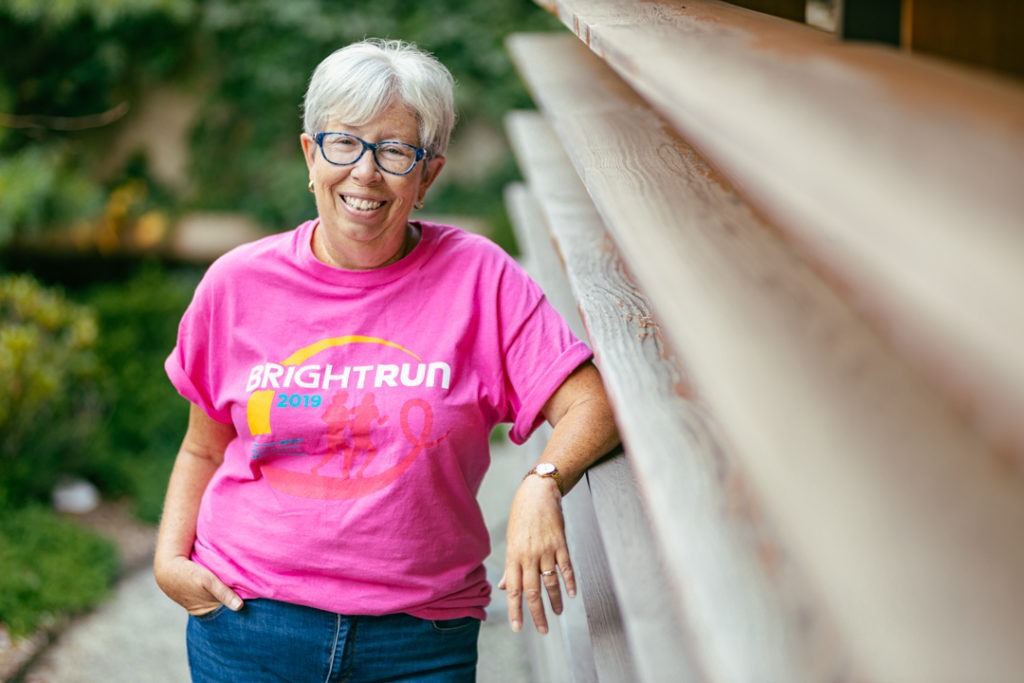
Chemo brain: You’re not alone
Lee Prokaska enjoyed a long career as a reporter, editor and editorial writer for The Hamilton Spectator, where job requirements included having a sharp mind and a way with words. But during chemotherapy treatments for breast cancer, words began to escape her – literally.
“While it’s normal for people to occasionally struggle for words, especially as they age, what I faced during and after chemo was much more severe,” said Prokaska, 64, who was experiencing brain fog, also known as chemo brain.
Brain fog versus forgetfulness
“With brain fog, you stumble for your best friend’s name.”
“You forget things you should absolutely know,” said Prokaska, who was diagnosed with breast cancer almost 16 years ago and treated at Hamilton Health Sciences’ Juravinski Hospital and Cancer Centre (JHCC).
“With brain fog, you stumble for your best friend’s name. You can’t remember your mother’s phone number even though you’ve dialed it for 45 years.”
Prokaska’s ability to multi-task was also impacted. “I’d get confused about what I was doing. My initial reaction was that the chemo was killing my brain, but my medical team assured me that wasn’t the case.”
Who is impacted

Dr. Karen Zhang is a clinical, health and rehabilitation psychologist at the JHCC.
Up to 70 per cent of chemotherapy patients experience symptoms of brain fog including decreased memory, shorter attention span and reduced ability to stay organized and multi-task, said Dr. Karen Zhang, a clinical, health and rehabilitation psychologist at the JHCC.
The cause isn’t clear but stress, anxiety, trouble sleeping and the body’s reaction to chemotherapy could combine to trigger symptoms.
“Cognitive testing tends to show that individuals experiencing chemo brain are functioning in a range that indicates no cognitive impairment,” said Zhang. “While they aren’t near the point of dementia or other acquired brain injuries, they’re still experiencing symptoms that they find alarming.”
Brain fog typically improves with time, though it can last up to two years or more after cancer treatment. Risk factors for longer-lasting symptoms include depression and anxiety, said Zhang.
Recovery time
Prokaska returned to work 10 months after finishing cancer treatment that included surgery, chemotherapy and radiation. “My job involved words, which I sometimes had trouble finding,” said Prokaska, who also couldn’t remember how to use her work’s computer programs when she first returned. “It was like I had never sat in front of a computer before.”
“I hid it well. After a couple of weeks, no one would have guessed I was struggling.”
Those first days back, she questioned whether she could continue working. “I wasn’t used to being so easily confused and confounded by simple tasks I had been doing for years.”
Coping strategies
But she persevered, and discovered new strategies for staying organized such as writing reminders on her desk calendar and using sticky notes to track tasks. “I hid it well. After a couple of weeks, no one would have guessed I was struggling and after six months I was back to feeling confident, though I did continue to use paper reminders.”
Prokaska retired from The Spectator five years ago, finishing strong. Her last position was a senior one that included writing editorials and editing guest op-ed pieces and letters-to-the-editor. She now volunteers writing the monthly newsletter for BRIGHT Run, a fundraiser for local breast cancer research that’s taking place Sept. 12.
“That’s what we have Google for.”
Prokaska can’t say how long her brain fog lasted, but the habit of using paper reminders stuck and she continues to use them to track appointments.
“Do I still have brain fog? Probably not. I sometimes grope for words or names, but we all do at a certain point in our lives. That’s what we have Google for.”
Paper reminders like desk and wall calendars and sticky notes are excellent ways for people to stay on track, said Zhang, who also encourages those struggling with brain fog to look for ways to work through stress instead of avoiding it.
She praised Prokaska for persisting during those first days back to work. “What she did is quite remarkable. It would have taken a lot of strength and bravery to force herself into a situation that caused so much stress, and keep pushing until she got past it.”
Help for patients experiencing brain fog:
JHCC Psychosocial Oncology Program
The Psychosocial Oncology Program at the JHCC offers support for patients and family members impacted by cancer. This program is dedicated to helping adult patients and their families cope with the psychological, emotional, social, spiritual, and functional impact of cancer. The interdisciplinary team consists of a psychologist, psychiatrists, nurses, social workers and dietitians. Services are available by referral from the patient’s oncologist or nurse.
Wellspring Cancer Support Brain Fog Online Program
This educational program teaches ways to address and improve cognitive functioning. Under the direction of an experienced professional leader, participants meet with others who are experiencing similar difficulties and learn proven strategies that can be adapted to individual styles and daily needs. Registration is required for this eight-week program.
